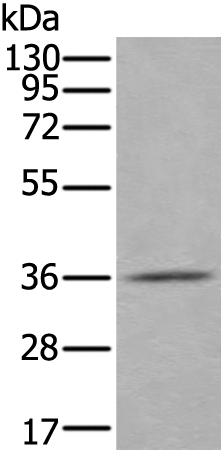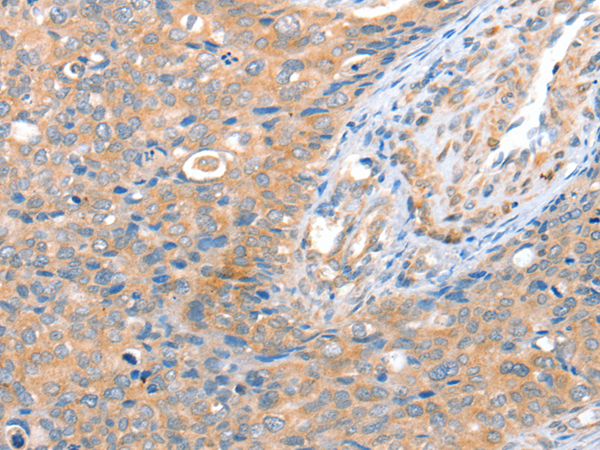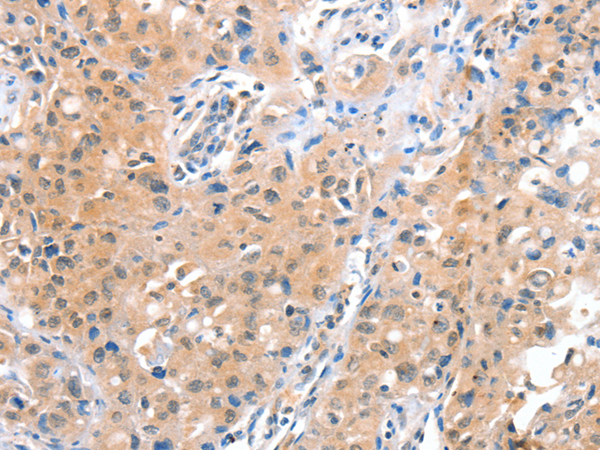


| WB | 咨询技术 | Human,Mouse,Rat |
| IF | 咨询技术 | Human,Mouse,Rat |
| IHC | 1/15-1/50 | Human,Mouse,Rat |
| ICC | 技术咨询 | Human,Mouse,Rat |
| FCM | 咨询技术 | Human,Mouse,Rat |
| Elisa | 1/2000-1/5000 | Human,Mouse,Rat |
| Aliases | hTE; PTE1; PTE2; PTE-1; PTE-2; HNAACTE; hACTE-III |
| WB Predicted band size | 36 kDa |
| Host/Isotype | Rabbit IgG |
| Antibody Type | Primary antibody |
| Storage | Store at 4°C short term. Aliquot and store at -20°C long term. Avoid freeze/thaw cycles. |
| Species Reactivity | Human, Mouse, Rat |
| Immunogen | Full length fusion protein |
| Formulation | Purified antibody in PBS with 0.05% sodium azide and 50% glycerol. |
+ +
以下是关于ACOT8抗体的3篇文献示例(内容基于公开研究整理,部分信息可能需进一步核实):
---
1. **文献名称**:*Characterization of Acyl-CoA Thioesterase 8 in Lipid Metabolism*
**作者**:Zhang Y, et al.
**摘要**:本研究利用特异性ACOT8抗体,通过Western blot和免疫荧光技术,揭示了ACOT8在小鼠肝脏细胞中的亚细胞定位(过氧化物酶体和线粒体)。实验表明,ACOT8通过水解长链酰基辅酶A调控脂肪酸氧化,其表达水平受高脂饮食调控。
---
2. **文献名称**:*ACOT8 Antibody Validation for Human Cancer Studies*
**作者**:Smith JL, et al.
**摘要**:文章报道了一种新型兔源多克隆ACOT8抗体的开发与验证。通过siRNA敲低实验和质谱分析,证实抗体特异性。研究发现,ACOT8在结直肠癌组织中高表达,且与患者预后不良相关,提示其可能作为肿瘤代谢治疗的靶点。
---
3. **文献名称**:*Role of ACOT8 in Beta-Oxidation and Mitochondrial Dysfunction*
**作者**:Garcia-Ruiz I, et al.
**摘要**:利用ACOT8抗体进行蛋白质表达分析,发现ACOT8缺陷小鼠线粒体中酰基辅酶A累积,导致活性氧(ROS)水平升高。研究证明ACOT8通过维持酰基辅酶A稳态,保护细胞免受氧化应激损伤,与代谢综合征相关。
---
如需获取具体文献全文,建议通过PubMed或Web of Science检索DOI或PMID进一步查询。
The ACOT8 antibody is a research tool designed to detect and study Acyl-CoA thioesterase 8 (ACOT8), an enzyme involved in lipid metabolism. ACOT8. also known as thioesterase superfamily member 2 (THEM2), belongs to the acyl-CoA thioesterase family, which catalyzes the hydrolysis of acyl-CoA thioesters to free fatty acids and coenzyme A. This enzymatic activity regulates cellular levels of acyl-CoA substrates, influencing lipid synthesis, energy metabolism, and signaling pathways. ACOT8 is localized in mitochondria and peroxisomes, with roles in maintaining lipid homeostasis and modulating metabolic stress responses.
Research links ACOT8 to various physiological and pathological processes, including insulin resistance, cancer progression, and neurodegenerative diseases. For instance, ACOT8 overexpression has been associated with altered fatty acid oxidation in metabolic disorders. Antibodies against ACOT8 enable detection via techniques like Western blotting, immunohistochemistry, and immunofluorescence, aiding in protein expression profiling, subcellular localization studies, and mechanistic investigations. Commercial ACOT8 antibodies are typically raised in rabbits or mice, targeting specific epitopes within the protein. Validation includes testing for specificity, sensitivity, and cross-reactivity. These tools are essential for exploring ACOT8's biological functions and its potential as a therapeutic target in metabolic and oncological research.
×